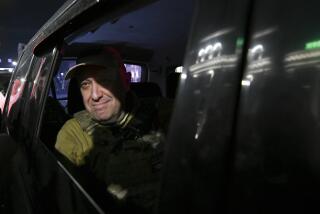Power Struggle Shakes Leadership of Russia : Politics: The federation vice president and KGB chief square off. Yeltsin delays his return amid the disarray.
MOSCOW — The Russian Federation leadership fell into further political brawling on Thursday as a power struggle sharpened in the Soviet Union’s largest republic, deepening the crisis that had appeared to be on its way to resolution with the failure of the conservative coup d’etat in August .
Russian Vice President Alexander V. Rutskoi, in an angry public confrontation with the head of the republic’s KGB, denounced the security chief as lazy and incompetent, a danger to the state. Rutskoi said he will demand his dismissal.
The KGB chief, criticizing Rutskoi’s attempts at peacemaking in the troubled Chechen-Ingush region, warned of the threat of a civil war in the Caucasus Mountains, spreading terrorism across Russia and perhaps the eventual breakup of Russia as a state.
The acting chairman of the Russian Supreme Soviet, the republic’s legislature, said in turn that it was the political infighting among power-hungry factions of Russian Federation President Boris N. Yeltsin’s government that was thwarting efforts to pull the country out of its political, economic and ethnic crises.
Debate among members of the Supreme Soviet, the republic’s legislature, on these and other issues grew so angry Thursday that they could not agree on whether to put a draft constitution before the meeting of the Russian Congress of People’s Deputies later this month.
And, completing the picture of political disarray, Yeltsin did not return to work on Thursday as scheduled, remaining an extra day at Sochi, a resort on the Black Sea.
The change in plans caught Yeltsin’s press office by surprise; it announced that he was back at his desk in Moscow, only to retract the statement a few hours later. The Soviet news agency Tass reported Yeltsin’s return to Moscow late Thursday.
“The government on the whole has proved incapable of doing things in this complicated situation,” Ruslan Khasbulatov, the acting parliamentary chairman, commented in an interview, decrying the rampant rivalries in the Yeltsin administration and what he called plain power-grabbing.
Khasbulatov said he expects Yeltsin to nominate a new prime minister for Russia today, then to recast most of the government and his own advisers in an effort to halt the feuding and regain the political momentum.
Yeltsin is also to meet with Soviet President Mikhail S. Gorbachev this morning and to participate in a meeting of the State Council, the country’s new, top-level executive body, which includes central government officials and the republics’ leaders.
On the State Council’s agenda, Tass said, is an agreement, now the focus of widespread criticism, that would establish an “economic community” among the Soviet Union’s former republics. On Thursday, President Askar Akayev of Kirghizia said his republic would not sign the treaty in its present form.
There will also be discussions on reforming the currency and banking systems, collecting taxes, ensuring centralized customs clearance, power generation and transport.
But there is growing impatience with the failure of the government at all levels to use the political power it gained with the defeat of the conservatives in August and to break through the old barriers to fundamental reforms.
“While the government is procrastinating, new trouble spots are developing across Russia,” Khasbulatov said. “The Komi autonomous republic, the north Caucasus, Tataria are all stirring uneasily. . . . The government must work, day and night, for stability.”
A new crisis in the Chechen-Ingush autonomous region in the northern Caucasus touched off the open feuding Thursday, but the real issues went beyond that local struggle for power to the question of who rules in Russia.
Local leaders are demanding that the region’s government resign, accusing it of supporting the attempted coup against Gorbachev. On Thursday, they mobilized all men from ages 15 to 55 for “armed resistance to any infringements by Russia’s authorities.”
Khasbulatov, a Chechen himself, contended that the principal leader, Johar Dudayev, 45, a retired general and chairman of the General Congress of the Chechen People, and his supporters are little more than “bandits” and should be dealt with accordingly.
But Viktor V. Ivanenko, chairman of the Russian Committee for State Security, as the KGB is formally known, urged a dialogue with Dudayev to avoid worsening the conflict. As the KGB chief finished speaking, Rutskoi bounded from the floor of the chamber, charged to the podium and denounced Ivanenko for contradicting reports by Khasbulatov and himself.
Gennady E. Burbulis, the Russian secretary of state, one of Yeltsin’s closest advisers and a major figure in the power struggles, acknowledged in a television interview this week that the Russian government is in crisis. Pressed to rate the Yeltsin administration’s control over the vast republic, Burbulis replied: “What do you want? An accountant’s calculation? All right, I would say about 70%.”
Even radical reformers are dismayed, seeing the deep divisions between Yeltsin allies and the legislature, particularly between Burbulis and Khasbulatov, as undermining the political and economic changes that became possible after the conservatives’ defeat.
Viktor K. Grebenshikov, a reporter in The Times’ Moscow Bureau, contributed to this story.
More to Read
Sign up for Essential California
The most important California stories and recommendations in your inbox every morning.
You may occasionally receive promotional content from the Los Angeles Times.










